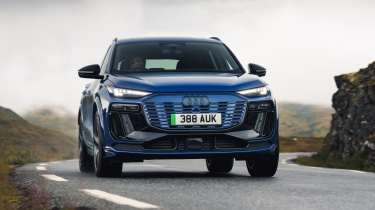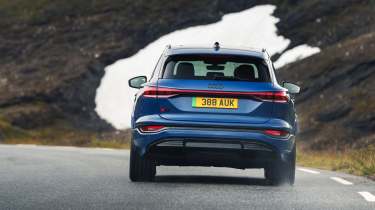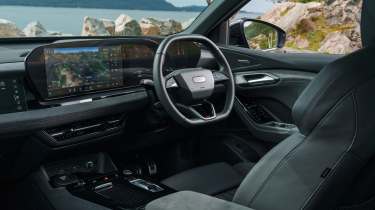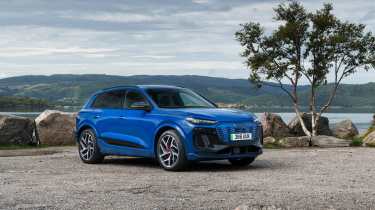Audi Q6 e-tron 2024 review – a calling card for future Audi EVs
Audi’s new Q6 e-tron debuts the firm’s PPE architecture, which will go on to underpin its future EVs. Is it a worthy alternative to the Porsche Macan?
The Audi Q6 e-tron is a very important car, but you wouldn't know by looking at it. It's a largely anonymous electric SUV of the kind we’ve seen before, but beneath the nondescript exterior lies Audi’s new Premium Platform Electric (PPE) architecture that promises a generational leap in performance, efficiency and packaging. The platform also underpins the new A6 e-tron and will form the basis of a host of forthcoming electric Audis, making the Q6 a calling card for what’s to come from the brand.
The numbers look promising for the top-spec Quattro model we’re testing. It gets a motor on each axle for a combined 383bhp, with the platform’s 800-volt electronic architecture helping achieve rapid charging speeds of 270kW. Topping up the 94.9kWh floor-mounted battery pack from 10 to 80 per cent takes 21 minutes, and Audi claims an impressive range of 381 miles from a full charge for the Quattro in Sport trim (Audi calls this the Sport Quattro, which seems a bit sacrilegious). That’s 117 more than BMW’s iX xDrive40.
Inevitably, packing this much battery and motor into an SUV brings with it a scale-crushing kerb weight. 2325kg to be exact. That’s within a few kilos of the Porsche Macan 4, which also uses PPE underpinnings but with more driver-centric tuning for its suspension and controls.
More reviews
Group tests
- Lotus Emira Turbo SE v Alpine A110 GTS – two of the last surviving mid-engined sports cars
- Alpine A290 v Alpine A110 – how much DNA do they really share?
- Ariel Atom 4R v Ariel Nomad 2 – is grip more fun than slip?
- Ariel Atom 4R v Caterham Seven ‘evo25’: power-to-weight heroes go head-to-head
- Ariel Atom 4 v Caterham Seven 310R v Lotus Elise Cup 250
- £200,000 supercar shoot-out: AMG v Aston Martin v Maserati v McLaren
- Audi Quattro, RS2 and RS3: five-cylinder icons head-to-head
- Who makes the best GT car? Aston Martin v Bentley v Maserati
- Caterham Super Seven 600 v Super Seven 2000
- Corvette Stingray v Porsche Cayman GTS v Audi R8 RWD
In-depth reviews
- Abarth 600e 2025 review – Italy gives the Alpine A290 something to worry about
- Alpine A110 R Ultime review – Ferrari money for a four-cylinder, but it might be worth it
- Alpine A110 review – the sports car Lotus should be building
- Aston Martin Vantage 2025 review – a thrilling Mercedes-AMG GT and 911 Turbo S alternative
- Used Audi RS2 (1994) review – an unsung '90s hero you can own for £40k
Long term tests
- Living with the Abarth 695C, a fun Italian hot hatch that makes you feel 17 again
- Alfa Romeo Giulia Veloce long term test – can Italy beat Germany?
- Alpina B10: Alpina B10: end of term report
- Aston Martin Vantage (2006) Fast Fleet test – living with a £30k V8 Aston
- Caterham Seven evo25 Fast Fleet test – living with a track car for the road
- Caterham Seven evo Edition revealed – bespoke 420R joins the Fast Fleet
- Cupra Leon 300 Fast Fleet test – living with Spain's 300bhp hot hatch
- Cupra Ateca VZN Fast Fleet test – four months with Cupra's hot crossover
- Cupra Leon Estate 310 4Drive Fast Fleet test – living with the 306bhp hot estate
- Ford Mustang GT
Reviews
- Ferrari 849 Testarossa review – can the SF90 successor challenge Lamborghini's Revuelto?
- Abarth 695 (2012-2024) review – why we’ll miss Italy’s Mini Cooper S rival
- Abarth 500e 2023 review
- AC Cobra 378 Superblower MkIV 2021 review – another V8 Cobra, but with a GM heart this time
- Acura Integra Type S 2024 review – a Honda Civic Type R with added restraint
- Alfa Romeo Giulia review – get one while you still can
- Alfa Romeo 33 Stradale 2025 review – a rare Italian jewel beyond compare
You wouldn’t know the two share the same platform, such is the stark difference in the way they drive. The Porsche is by far the more athletic and tightly controlled of the two, whereas the Q6 lumbers along the road with a softer stride. It very obviously puts cruising comfort and refinement near the front of its priorities, evidenced in its relaxed suspension movements and the effortless, remote feeling of the controls. If Audi set out to give the Q6 a completely distinct character to the Macan, it’s certainly achieved that.
The trouble is, that character hasn’t been executed to the world-beating standard you might expect from a ground-up, new-generation Audi EV. To be clear, there’s nothing wrong with the way the Q6 drives. It’s pleasant to spend miles in, sailing along smoothly on its air suspension and keeping you well isolated from outside noise, but there’s nothing exceptional about it. BMW’s iX, for instance – a car that launched back in 2021 – is truly impressive in terms of comfort and refinement, whereas the Q6 never quite feels like the next-gen product it is.
The iX’s sometimes freakish ability to glide over the road surface isn’t replicated here, either. In Comfort mode there’s plenty of cushioning but the body heaves a little too much through big undulations, and Balanced offers a better, erm, balance. Dynamic doesn’t take the ride to pieces but does introduce more surface patter in the pursuit of tighter control, which is only a worthy trade-off on smooth roads.
Pick up the speed and you can place the Q6 accurately on the road, with a high vantage point of what’s ahead – higher, it seems, than in the Macan. In fact the Q6 as a whole feels larger than the Macan, despite the two being close in terms of dimensions. The Porsche’s precision and control contributes to this, because you can drive it to much finer margins and with greater precision. By comparison the Q6 feels remote and lazier, with slightly awkward movements across the body over tricky surfaces.
With that said, the Q6 has no trouble deploying the full 383bhp on dry roads, and picks up speed at a rate that would trouble most hot hatches. Carry momentum through a corner and as long as you don’t apply sudden inputs, the Q6 remains stable and will bleed into mild, manageable understeer. It certainly doesn’t reward like higher-spec versions of the Macan, but there are no nasty surprises either. The brakes are progressive and consistent in their response, too.
More of a concern is that you’ll often be turning the radio up as your palm brushes the Q6’s new haptic steering-wheel controls when turning a corner. Given the criticism surrounding such touch controls applied elsewhere in the Volkswagen group recently (we’re looking at you, Mk8 Golf), it’s baffling as to why Audi would introduce this kind of solution for its new-generation models (the new e-tron GT suffers from the same).
That aside, the Q6’s cabin feels thoroughly modern and well built, with an enormous and responsive dual-screen infotainment system spread across the dash. If you want more pixels there’s also the option of a third, 10.9-inch display ahead of the front passenger, but there isn’t a pressure-based climate control panel as you’ll find in some other Audis. There’s also too much glossy black trim for our liking, which might not hold up well to scrapes and scuffs over time.
The Q6 e-tron is a fine electric SUV in isolation, a competent cruiser with a compelling blend of performance, range and tech. Unfortunately for Audi, it doesn’t live in isolation – it lives in a world where BMW’s iX remains the class benchmark for luxury and refinement, and the Porsche Macan is king for driver appeal. The Q6 doesn’t move the game on significantly in any key area, and we expected a little more from an SUV that signals the start of a new era for Audi.
Price and rivals
Despite sharing its underpinnings with the electric Macan, the Q6 doesn’t match up to the Porsche in terms of price, with an £8k cheaper starting figure of £59,145. Admittedly, that’s for the 288bhp Q6 e-tron Sport, where the entry-level Macan comes with a chunk of extra power – 355bhp from a single rear motor.
The 322bhp Q6 e-tron Sport Performance costs from £62,645, and while it closes the performance gap to the Macan, it’s still nearly a second slower to 62mph. It does have a similar range figure of 393 miles, however.
The Sport Quattro sits at the top of the tree with a £68,145 asking price, and though it’s not as dynamically competent as the Porsche, it does present relatively good value in comparison to the base Macan by offering four-wheel drive and an extra 28bhp.
If you can get past the looks, the BMW iX offers a higher level of comfort and luxury than the Q6, but for a steeper asking price – £70,985. The iX falls down when it comes to range, though, achieving 264 miles in base xDrive40 trim. To bring the iX up to the level of the Q6’s range, you’ll need the xDrive50, which moves into an entirely different £100k+ price category.





